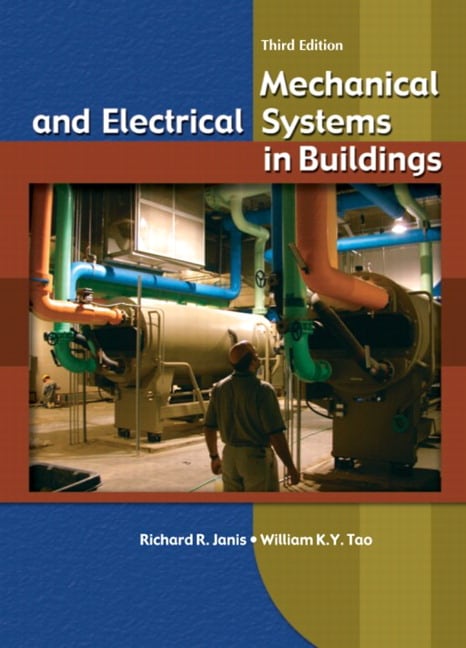
30.00$
Table of Contents
1. Introduction and Overview.
The Scope of Building M/E Systems. The Impact on Space Planning. The Impact on Architectural Design. The Impact on Construction Cost. The Impact on High-Rise Building Design. Energy and Energy Conversion. The Impact of Buildings on Global Environment. Environmentally Responsive and Integrated Designs. System Interfacing. Checklist of Building and M/E Requirements. Questions. References.
2. HVAC Fundamentals.
Environmental Comfort. Properties of Air-Water Mixtures. Energy Transport in HVAC Systems. HVAC Load Estimation. Calculating Heating Loads. Calculating Cooling Loads. Reference Tables and Figures. Wind Chill Factor (WCF). Questions.
3. HVAC Delivery Systems.
Control of Heating and Cooling. Zoning. Controls and Automation. Commonly Used Systems for Zone Control. Questions.
4. Cooling Production Equipment and Systems.
Refrigeration Cycles. Cooling Production Equipment. Direct Expansion (DX) Systems. Chilled-Water Systems. Heat Rejection from Cooling Systems to the Environment. Chilled-Water Plant Design. Questions.
5. Heating Production Equipment and Systems.
Types of Heating Systems. Heating Energy Sources. Furnaces and Air Heaters. Boilers. Selection of Medium and Equipment. Auxiliary Systems. Operating and Safety Controls. Heating Plant Design. Questions.
6. Air-Handling Equipment and Systems.
Air Handling Equipment. Heat Transfer. Air Cleaning. Air Mixing. Fans. Duct Systems. Air Devices. General Guidelines for Duct System Design. Questions and Exercises.
7. Piping Equipment and Systems.
Piping Systems and Components. Pumps. Heat Exchangers. Piping. Questions.
8. Plumbing Equipment and Systems.
Water Supply and Treatment. Domestic Water Distribution Systems. Plumbing Fixtures and Components. Planning Plumbing Facilities. Sanitary Drainage Systems. Sewage Treatment and Disposal. Storm Drainage System. Plumbing Services for Other Building Equipment. Questions. References.
9. Fire Protection Equipment and Systems.
Classification of Fire and Construction Hazards. Planning for Fire Protection. Fire Safety Design. Fire Detection and Signaling Devices. Fire Alarm Systems. Fire Suppression Systems. Automatic Sprinkler Systems. Smoke Controls. Summary. Questions. References.
10. Introduction to Electricity.
Direct Current (DC). Direct Current Generation. Alternating Current (AC). Advantages of AC over DC Systems. AC-to-DC Conversion. Single-Phase versus Three-Phase Alternator. Power and Power Factor. Voltage and Voltage Drop. Summary of Properties. Questions.
11. Power Systems and Equipment.
Power Distribution Systems. Voltage Spread and Profile. Grounding. Short-Circuit and Interrupting Capacity. Emergency Power Systems. Power Equipment. Conductors. Wiring Methods. Installation of Wires in Raceways. Wiring Devices. Protective Devices. Questions.
12. Communications, Life Safety, and Security Systems.
Form and Function of Information Systems. Common Characteristics of Auxiliary or Information Systems. Classification of Auxiliary Systems. Components and Wiring. Telecommunication Systems. Data Distribution Systems. Security Systems. Telephone Systems. Fire Alarm Systems. Sound System. Time and Program Systems. Miscellaneous and Specialty Systems. Questions.
13. Electrical Design and Wiring.
Electrical Design Procedure. Analysis of Building Needs. Determination of Electrical Loads. System Selection and Typical Equipment Ratings. Coordination with Other Design Decisions. Drawing Up of Electrical Plans and Specifications. National Electrical Code. Branch Circuits. Tables and Schedules. Power Wiring Design Problem. Wiring of Low-Voltage Systems. Questions.
14. Light and Lighting.
Light and the Energy Spectrum. Physics of Light. Vision and the Visible Spectrum. Color. Light Controls. Questions. References.
15. Lighting Equipment and Systems.
Electrical Light Sources. Factors to Consider in Selecting Light Sources and Equipment. Incandescent Light Sources. Fluorescent Light Sources. High-Intensity-Discharge Light Sources. Miscellaneous Light Sources. General Comparison of Light Sources. Luminaires. Luminaires: Photometry. General Comparison of Lighting Systems. Questions.
16. Calculations of Illumination.
Quantity and Quality of Illumination. Evaluating the Visual Environment. Illuminance Categories and Recommended Illuminance Levels. Basis for Illumination Calculations. The Zonal Cavity Method. Application of the Zonal Cavity Method. Point Method. Computer Calculations and Computer-Aided Design. Questions.
17. Lighting Design.
Design Considerations. Lighting Design Development. Lighting Design Documentation. Daylight. Exterior Lighting Design. Design Practice and Alternative Solutions. Questions.
18. Noise and Vibrations in Mechanical and Electrical Systems.
Retrospection. Noise Control–An Overview. Building Spaces Where Acoustical Concerns May Arise. Basic Concepts of Sound. Useful Design Criteria. Acoustical Design Considerations in HVAC Systems. Mechanical Equipment Rooms (MERs). Rooftop Units (RTUs). Sound in Ducts. Duct Silencers. Plenum Chambers. Sound Power Division in Duct Branches. Duct End Reflection Loss. Return Air Systems. Room Sound Correction. Transmission of Sound Through Walls and Ceilings. Adding Decibel Quantities. Sound Pressure, Sound Power, and Sound Intensity Level. Acoustical Absorption. Sound Transmission Loss. Isolation of Mechanical Vibration. Vibration Isolators. Seismic Vibration Control and Restraint. The Richter Scale. Guidelines for Seismic Design. Questions. References.
19. Sustainable Design.
Sustainability Defined. Goals of Sustainable Design. Characteristics of Sustainable Design. Sustainable Design Process. Building Mechanical and Electrical Systems. Indoor Environmental Quality. Evaluating Design Options. Economics of Sustainable Design. Questions. References.
Appendix A: Glossary of Terms, Acronyms, and Abbreviations.
Appendix B: Glossary of Technical Organizations.
Appendix C: Units and Conversion of Quantities.
Index.
***THIS IS NOT THE ACTUAL BOOK. YOU ARE BUYING the Test Bank in e-version of the following book***
Mechanical and Electrical Systems in Buildings, 3rd Edition PDF Manual Solutions , PDF Mechanical and Electrical Systems in Buildings, 3rd Edition , Fast Download Mechanical and Electrical Systems in Buildings, 3rd Edition , William K. Y. Tao, Tao & Lee Associates Richard R. Janis, Washington University, St. Louis,Category : Higher Education

0 commentaires:
Enregistrer un commentaire